Saving money on raising a horse

My best friend is looking to get a horse, but is worried about the financials, so together we did some digging and here are some considerations around reducing cost when getting and homing your new four-legged friend.
Raising a horse is not just for the elite. While raising a horse can be expensive and there are some areas where quality is paramount such as horse riding equipment, you can certainly save the cost from being exorbitant. In fact, if you pay enough consideration, you won’t have to spend too much on anything else:
- Good quality hay is an essential component of horse care. This is an area where a horse owner should not compromise. However, a way to significantly reduce the cost of the hay is to buy it in bulk and, that too, in hay season. In winters, the cost of purchasing feed or getting it delivered is considerably higher due to low availability. So, stock up well before the winter comes, and you would be saving a lot of pounds!
- Those willing to go a bit further to save more can grow their own hay. It takes about seven months and is relatively easy. After the harvest, you would need to cut, dry, and store it.
- You don’t need to feed a horse concentrates unless there is a specific reason for it. Moreover, for most horses, a simple diet of quality hay and grass suffices.
- If you reside in an area with multiple channels of buying feed such as stores, co-ops, and mills, analyse all the options by comparing their quality, composition, and prices. We are conditioned to believe that a brand ensures the utmost quality of a product. This may not always be true.
- Consider quality when you buy horse riding equipment. Cheaper is not always the best option. In fact, it is preferable to go for a brand name such as Church Equestrian when it comes to equipment and horse grooming kits. This is because higher cost often points to higher quality of material, design, and stitching. The products are well-built, so they last longer than generic ones and are, in general, safer for you and your horse.
- Products serving the equestrian niche are usually higher priced despite being identical to generic products. While products that your horse consumes, such as feed, must be tailor-made for them, many others can be bought from your local store.
- Another way to save money while raising your horse is to take group lessons rather than personal ones. A trainer usually does not need to watch you ride during the entire session. If you still want personal attention, opt for a private class first. Once you have learned the ropes and just want to hone your skills with practice and a little guidance, switch to group sessions.
- If you are considering boarding your horse, opt for pasture boarding rather than full boarding. Watch out for the weather in your area though, as in pasture boarding the horse lives outdoors throughout the year with feed, run-in shelter, and water.
- Some stables provide a reduced cost for those willing to carry out some work such as mucking out. An alternative for those who can’t commit time to the stables’ work can let their horse be used for trail rides or riding lessons instead.
- Several future horse owners envision a great many adventures with their horses and so buy horses with professional-level training. This is not only costlier due to the effort of training but also many a time in vain. If you are a beginner, you will not require a horse that can do high-performance sports but one that is simply trained well.
- Consider buying an older horse. Many turn down the prospect of buying an older horse for the fear they will not get to ride them as much as they would like to. This is, however, not true. Many healthy and well-kept older horse can be ridden well for a long time. Moreover, they make better beginner horses than young ones as they are tame and usually trained too.
- However, if you have extra time or goods, you can also choose to barter chores with others.
- Remember, prevention is better than cure. Treating your horse of its infections, injuries, and sunburn will cost more than taking quality care of it. Many illnesses in your horse can be avoided by taking care of their feed and environment, such as safe fencing. A horse riding shop will be your best bet to find many products that will assist.
- If you are looking to expand your stud, consider getting a foal instead of breeding your existing stud. Many usually think breeding is cheaper than buying a foal; however, it is a misconception. Pregnancy of the mare and foaling requires extensive care and money. The cost of breeding to a high-quality stallion, veterinarian costs, and sometimes injury during the breeding process can add up quickly. If your shelter is small, you may need to build a larger one for her. Also, if you were trying to save money by giving her for lessons and trails, it will need to stop for some time as the foaling date comes closer, she must not be ridden.
While the above tips are primarily related to caring for your horse, there are some little ways as well that save money in the long run, but we tend to forget about them. Here are some more tips to make raising a horse even more cost-effective:
- Don’t replace what can be repaired
- Sell equipment that is unused, or you don’t require any more
- Wait for end-of-season sales and discounts to get products cheaper
- Turn the lights off when your barn is not in use.



Leave a Reply